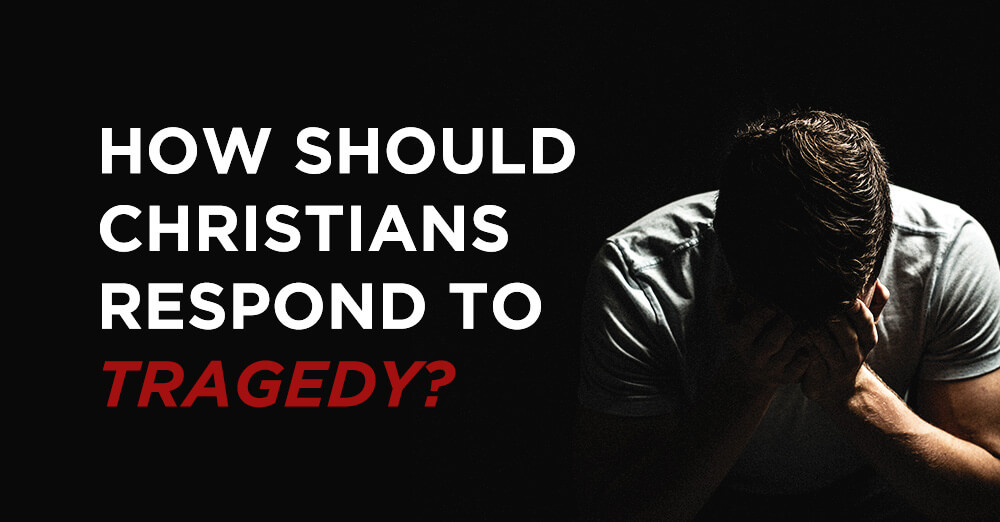
National and global tragedies always leave in their wake a fog of questions: "Who is responsible? What do we do? How can we pray?" As in all things, Christians must first ask themselves, "What does God's Word say? What does Christ's example teach us?"
How Did Jesus Respond to Tragedy?
In Luke 13, we find an interesting conversation in which Jesus references a recent tragedy: "Or those eighteen who died when the tower in Siloam fell on them do you think they were more guilty than all the others living in Jerusalem? I tell you, no! But unless you repent, you too will all perish" (Luke 13:4-5).
Previous conversations around the tragedy in Siloam probably sounded familiar: Jesus, why did this to happen? Was this event an act of God's judgment on their sin? Shouldn't the builders of the collapsed tower be punished for their shoddy workmanship?
In times of tragedy, Jesus reminded others of the bigger picture and responded with the Gospel. Here He focused on the greater point beyond the why did this happen and the who is to blame of the tragedy in Siloam: All are in need of salvation. Therefore our message in tragedy should be the same as on every other day: Come to Jesus Christ! Only in Him is there hope. Only in Him is there forgiveness of sins.
That is Christ's message to those who lose their loved ones, to those who perpetrate violence and terror, and to every person who doesn't yet know the Savior. How easy it is to overcomplicate this simple Gospel.

"Too often opinions replace action and social media posts replace prayer. We turn off our computer screens feeling a sense of accomplishment, when in reality we have neglected the greater acts of acting justly, loving mercy, and walking humbly with our God."
He grieved. Jesus was deeply compassionate toward both His friends and His enemies. In grief He wept for His dead friend Lazarus, and in grief He wept for those in Israel who would reject Him (see John 11:35, Luke 19:41, Luke 23:34).
Paul's exhortation to "rejoice with those who rejoice; mourn with those who mourn" has no qualifiers (Romans 12:15). It's not a commandment for Christians to simply share in the burdens of other Christians, but for Christians to share in the burdens of all people whether a Christian fleeing persecution or a parent who has just lost a loved one in a senseless massacre.
So What Do We Do Now?
We recalibrate. Regardless of the political and social issues that inevitably arise following every tragedy, we are called to share the Truth of the Gospel and love our neighbor. Sometimes we are better evangelists for our own politics than we are for Christ's Gospel. Too often opinions replace action and social media posts replace prayer. We turn off our computer screens feeling a sense of accomplishment, when in reality we have neglected the greater acts of acting justly, loving mercy, and walking humbly with our God (Micah 6:8).
What if we gathered our fellow Christians together for a time of prayer? What if we sought God's Word on the matter? What if we took time to share Christ with the people around us or served those with practical needs? What if we partnered with organizations that are dedicated to reaching the lost? It's time we realign with God's mission.
We love sinners. Who are the despised Samaritans and crooked tax collectors in your life? It was Jesus who engaged with these people and called them into a relationship with the living God. It's time for us to get uncomfortable and share Christ with the Samaritans of our day, whether that's our wayward friend or non-believing neighbor. As we develop relationships with those around us, God will lead us and use us to "bind up the brokenhearted [and] to proclaim freedom for the captives," just as Jesus did (Isaiah 61:1).
We unite as one Body to pray and to serve. Before the road to the cross, one of the primary concerns of Christ's prayers for His children was that they be unified in Him (see John 17). He also emphasized corporate prayer as one of the most important acts of the Christian faith (see Matthew 18:20). The more God's people are unified in Christ, the more God Himself is glorified. The more we lay aside our political differences and devote ourselves to the greater work of God's Word, fellowship, and prayer, the more the Lord will add to our numbers (see Acts 2:42-47).
How Can We Pray?
How is God leading you to pray? As you seek His direction, here are some good prayer points:
Prayer: Lord, how we need You! Our world is broken. Teach us how to love not only "in word and speech, but in action and truth" (1 John 3:18). Deliver us from all fear that keeps us from sharing Your Gospel. Send more workers into difficult harvest fields even if that includes me, Lord. Reveal Yourself to the lost in the midst of this tragedy. Expose the danger of sin and reveal the Truth of Christ to the lost as they reflect on these events. All glory, power, and honor belong to You, Lord. Have Your way. I pray this in the name of Jesus. Amen.
Leading The Way is passionately proclaiming the uncompromising Truth of Christ here at home and around the world. Learn more about the ministry's global impact, and consider partnering with us as we broadcast the Gospel and disciple new believers.
Related Content